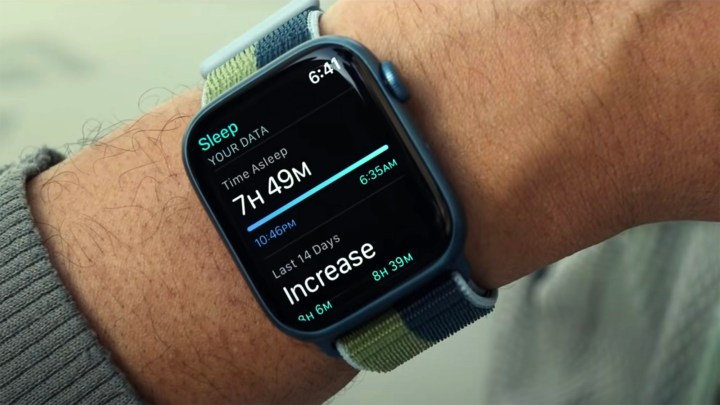A growing selection of mobile apps purports to help you fall asleep and measure the quality of your slumber as a record number of Americans deal with insomnia.
Subscription-based apps like Loona offer stories read in a soothing voice and sounds meant to be calming and block out noises. Other apps like SleepScore claim to measure the amount of sleep you are getting and let you know if it’s enough. But some medical professionals expressed doubts about whether apps like these help.
“Sleep apps are often inaccurate and affected by many variables, and none of them record true sleep,” Dr. Abhinav Singh, a medical review expert at SleepFoundation.org and the medical director of the Indiana Sleep Center, told Digital Trends in an interview. “None of the information discovered through the app is admissible as valid medical information in the patient’s medical chart.”
Sleep problems

Getting enough sleep is an increasing challenge for many people, experts say. A recent survey shows that people are not getting enough sleep, impacting their well-being. The survey found that 62% of people are not getting regular, good sleep more than half of the time.
“If you are dealing with fatigue during the day, it could be from a myriad of factors from, of course, poor sleep to other conditions such as hormonal imbalance, anxiety, or chronic pain,” Dr. Chris Airey told Digital Trends. “Measuring not only hours slept but the quality and phases of sleep can help narrow down the causes of your fatigue. After all, if you are getting seven to eight hours of proper sleep but still feel tired, there’s likely a reason other than lack of sleep.”
Singh said that the increasing number of people working from home is part of the problem. “If you are using your bedroom as an office, your brain then gets adapted to think that sleep is not the only activity in the bedroom, making it harder to fall asleep,” he added.
Singh said that light exposure from screens in the bedroom could disrupt evening circadian signals, suppress melatonin release, and delay bedtime. A bedroom as an office may blur boundaries. You may work longer and miss out on external light cues (sunlight) and meal cues, essential circadian timekeepers for your body.
Drinking booze before bed can also hurt your sleep. Although some people feel that drinking shortens the time to fall asleep, Singh said the losses outweigh the benefits. Alcohol can lower airway tone, increase snoring, and cause instances in which you stop breathing (apnea).
“Qualitatively, the alcohol can reduce the quality of sleep by preventing you from going into deeper states of sleep and also cause increased micro awakenings and sleep fragmentation,” Singh added. “That’s why no one in the world can say truthfully, ‘I had five shots of whiskey last night right before bed, and I feel great this morning.'” Singh said that as working from home becomes more common, people’s brains are getting confused. “If you are using your bedroom as an office, your brain then gets adapted to think that sleep is not the only activity in the bedroom, making it harder to fall asleep,” he added.
One apparent reason people have trouble falling asleep is external noise, like a dog barking, and internal noise, like stressful thoughts, Craig Richard, a professor of physiology at Shenandoah University, told Digital Trends in an interview.
“Apps help people fall asleep because the content can mask outside noise, less likely to hear a dog barking, and distract the internal noise, the mind switches from stressful thoughts to the content they are listening to,” Richard said.
Digital remedies

To choose the app best suited for you, it is vital first to understand what kind of sleep difficulties you face, Mairav Cohen-Zion, the chief science officer of Dayzz, a sleep and wellness app company, said in an interview.
If you find it difficult to relax before bedtime, perhaps some yoga or relaxation apps might do the trick, said Cohen-Zion. However, if you are looking to track your sleep simply to become familiar with your sleeping habits, a tracking device may be enough.
“But if you feel tired, need help to understand your sleep issue, and are interested in a more well-rounded treatment plan, then consider full sleep training apps,” Cohen-Zion added.
Richard said that apps containing ASMR video or audio content are likely to help users fall asleep. Several published studies have reported that watching ASMR videos or listening to ASMR audio decreases heart rates, increases relaxation, and allows users to fall asleep more quickly.
One popular app dedicated to ASMR content is Tingles. “Tingles has a large, varied selection of ad-free ASMR content, although access may require an in-app purchase. Free ASMR videos, with and without ads, can be easily accessed on the YouTube app,” Richard said. “Similarly, free ASMR audio, also with and without ads, can be found on any podcast app, such as Apple Podcasts, Google Podcasts, and Spotify.”
Tracking the amount and quality of sleep you get is also essential, Airey said. He recommends the Apple Watch and the Fitbit Versa 2 to keep an electronic eye on your sleep schedule.

“Obviously these are both at a rather high price point, but I like that they have a simple interface, easy setup, and look nice,” Airey said. “They can both use Siri and Alexa respectively, which means no screen glancing to set the alarm etc.”
But Airey warned against using a smartwatch or app to diagnose sleep disorders. “Data is useful, but interpreting the data and knowing how to apply it in a clinical setting are very specialized, professional skills,” Airey said. “Sleep labs help diagnose sleep issues and disorders, and these smartwatches simply provide data. They may become more nuanced in which data they are able to collect, but there will likely always need to be a specialist to apply the data to treatment.”
If you find that apps don’t help sleep, you might turn to a low-tech solution. Cohen-Zion noted that exercising regularly has been well-known to play a significant role in getting quality sleep. She suggests building a 15 -to 30-minute workout plan that you can commit to and implement easily at home (push-ups, crunches, squats, lunges, or yoga) or even just commit to 30 minutes at least three times a week.
“Walking helps boost your wellbeing because it increases blood flow to the brain and body,” Cohen-Zion said.
Editors' Recommendations
- Is the messages app on your Samsung phone crashing? Here’s how to fix it
- Your Google Photos app may soon get a big overhaul. Here’s what it looks like
- The Google app on your Android phone is getting a helpful new feature
- The 1Password Android app just got a huge upgrade
- The best iPhone and Android apps for Black History Month 2024


